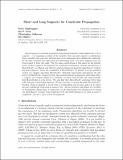Files in this item
Short and long supports for constraint propagation
Item metadata
| dc.contributor.author | Nightingale, Peter | |
| dc.contributor.author | Gent, Ian Philip | |
| dc.contributor.author | Jefferson, Christopher Anthony | |
| dc.contributor.author | Miguel, Ian James | |
| dc.date.accessioned | 2013-05-01T09:31:02Z | |
| dc.date.available | 2013-05-01T09:31:02Z | |
| dc.date.issued | 2013-01 | |
| dc.identifier | 49065487 | |
| dc.identifier | b0d73014-a4ad-43d3-82ef-e04bf274b967 | |
| dc.identifier | 84875551217 | |
| dc.identifier | 000314864000001 | |
| dc.identifier.citation | Nightingale , P , Gent , I P , Jefferson , C A & Miguel , I J 2013 , ' Short and long supports for constraint propagation ' , Journal of Artificial Intelligence Research , vol. 46 , pp. 1-45 . https://doi.org/10.1613/jair.3749 | en |
| dc.identifier.issn | 1076-9757 | |
| dc.identifier.other | ORCID: /0000-0002-5052-8634/work/34029958 | |
| dc.identifier.other | ORCID: /0000-0003-2979-5989/work/60887561 | |
| dc.identifier.other | ORCID: /0000-0002-6930-2686/work/68281455 | |
| dc.identifier.uri | https://hdl.handle.net/10023/3503 | |
| dc.description.abstract | Special-purpose constraint propagation algorithms frequently make implicit use of short supports -- by examining a subset of the variables, they can infer support (a justification that a variable-value pair may still form part of an assignment that satisfies the constraint) for all other variables and values and save substantial work -- but short supports have not been studied in their own right. The two main contributions of this paper are the identification of short supports as important for constraint propagation, and the introduction of HaggisGAC, an efficient and effective general purpose propagation algorithm for exploiting short supports. Given the complexity of HaggisGAC, we present it as an optimised version of a simpler algorithm ShortGAC. Although experiments demonstrate the efficiency of ShortGAC compared with other general-purpose propagation algorithms where a compact set of short supports is available, we show theoretically and experimentally that HaggisGAC is even better. We also find that HaggisGAC performs better than GAC-Schema on full-length supports. We also introduce a variant algorithm HaggisGAC-Stable, which is adapted to avoid work on backtracking and in some cases can be faster and have significant reductions in memory use. All the proposed algorithms are excellent for propagating disjunctions of constraints. In all experiments with disjunctions we found our algorithms to be faster than Constructive Or and GAC-Schema by at least an order of magnitude, and up to three orders of magnitude. | |
| dc.format.extent | 45 | |
| dc.format.extent | 500018 | |
| dc.language.iso | eng | |
| dc.relation.ispartof | Journal of Artificial Intelligence Research | en |
| dc.subject | QA75 Electronic computers. Computer science | en |
| dc.subject.lcc | QA75 | en |
| dc.title | Short and long supports for constraint propagation | en |
| dc.type | Journal article | en |
| dc.contributor.sponsor | EPSRC | en |
| dc.contributor.institution | University of St Andrews. School of Computer Science | en |
| dc.contributor.institution | University of St Andrews. Centre for Interdisciplinary Research in Computational Algebra | en |
| dc.identifier.doi | https://doi.org/10.1613/jair.3749 | |
| dc.description.status | Peer reviewed | en |
| dc.identifier.grantnumber | EP/H004092/1 | en |
This item appears in the following Collection(s)
Items in the St Andrews Research Repository are protected by copyright, with all rights reserved, unless otherwise indicated.

